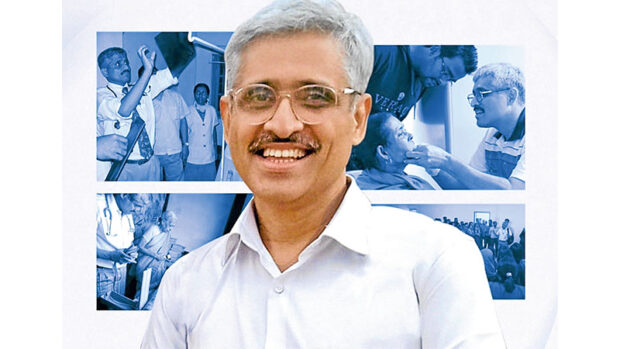Indian oncologist a ‘beacon of hope’ for cancer patients among the poor

HEALTH CARE FOR ALL Dr. Ravi Kannan of India is an advocate for grassroots health care, focusing on helping the poor, especially cancer patients who cannot afford expensive treatment. —RAMON MAGSAYSAY AWARD FOUNDATION
For many patients, being diagnosed with cancer is like a death sentence. Besides the complications of the disease itself, patients, including their relatives, have to deal with anxiety over the huge cost of treatment.
That’s why the Ramon Magsaysay Award Foundation (RMAF) chose this year to honor an Indian oncologist who has become a “beacon of hope” to his patients, the foundation said.
The Cachar Cancer Hospital and Research Centre (CCHRC) in the Barak Valley region of India has grown to become a comprehensive cancer institution for indigent patients under the leadership of Dr. Ravi Kannan, who has been its director for 16 years since 2007.
The hospital treats about 5,000 cancer patients and 20,000 others suffering from various diseases annually. Furthermore, CCHRC’s focus on poor communities has led to outreach programs on proactive treatment, along with grassroots cancer education campaigns.
These accomplishments on behalf of CCHRC have prompted RMAF to honor Kannan, 59, as a “Hero For Holistic Healthcare.”
Article continues after this advertisement“The RMAF board of trustees recognizes his devotion to his profession’s highest ideals of public service, his combination of skill, commitment and compassion in pushing the boundaries of people-centered, propoor health care and cancer care, and for having built, without expectation of reward, a beacon of hope for millions in the Indian state of Assam, thus setting a shining example for all,” the foundation said in its website.
Article continues after this advertisementPatient compliance
Despite the distinction he now enjoys, Kannan describes himself as being at the “bottom of the ladder” of India’s healthcare system.
RMAF had also noted that the hospital on his watch was able to increase patient compliance—or the extent to which patients are motivated to return for follow-up examination or treatment—from 28 percent to 75 percent.
But in an interview with reporters last week, he said: “If they don’t get treated at my place, they go home and die. So for us, 70 percent is not a good figure. We should be able to treat 80 or 90 percent of patients who come here.”
“In a big town, if a major hospital treats about 70 to 75 percent of patients that [go] there, that’s a very good figure. Because they [come] from far-off places… for a diagnosis and an opinion and they will go back to their hometown for treatment,” he explained further.
When he first started as CCHRC director, Kannan sought to ensure that patients were comfortable in their stay at the hospital.
But he noticed that many of them were daily wage earners who did not have the luxury of missing a day’s work.
“So if the breadwinner has to come for his or her treatment again and again for months, they don’t earn, their famil[ies] don’t eat,” he said. “So we said… everybody who goes out of the hospital will have a follow-up update.”
To further improve patient compliance, CCHRC not only followed up on the appointments of patients, but also introduced home cancer services, visiting the patients in their homes.
Kannan said the home services immersed the hospital staff in the living conditions of their patients, as they saw that “poverty is a reality” holding them back from continued treatment.
Making a difference
Despite the changes in hospital care that he introduced in CCHRC, he feels he has not accomplished enough.
“I don’t think I’ve dedicated my life to this. We do this out of choice,” he said.
Still, Kannan acknowledges that “as a group, we have been able to make a difference in some people’s lives and it’s a very satisfying feeling.”
The CCHRC was established by the nonprofit Cachar Cancer Hospital Society in 1996 to help narrow the gap in India’s cancer treatment system.
Before becoming its director a decade later, Kannan was head of the surgical oncology department of Adyar Cancer Institute in Chennai.
When asked why he traded that stint for a post in a fledgling health institute, he told RMAF that “it was where I was needed.”
CCHRC had very limited facilities when he came on board. Now it has 28 departments covering oncology, pathology, radiology, microbiology, epidemiology, tumor registry, and palliative care, among other services and specializations. From a staff of 23 in 2006, it now employs 451 people.
The hospital also conducts cancer education seminars for relatives and other companions of the patients. The seminars, which form part of CCHRC’s Preventive, Early Detection, and Palliative Care campaign, are held in the hospital as well as in other communities.
Kannan stressed the need to educate people on the importance of early detection—the stage when the disease is easiest to cure and for a very low cost.
He also plans to decentralize the hospital’s operations and establish more treatment facilities. In that effort, the RMAF could help, he said.
“I hope this will add power to our ability in transforming the community and having congregations with different groups—learning and also imparting our learnings to others. I hope this adds to more transformation in other places around us,” Kannan said. INQ
READ: Ramon Magsaysay awardee wins poor’s trust with lucky ‘card’